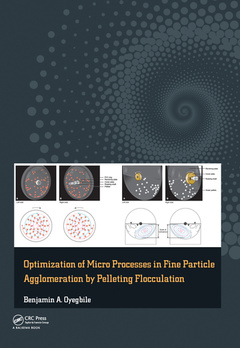Optimization of Micro Processes in Fine Particle Agglomeration by Pelleting Flocculation
Auteur : Oyegbile Benjamin

Efficient particle separation in order to meet stringent regulatory standards represent one of the biggest challenges facing the process industry operators today. Emerging environmental problems such as climate change, population growth and natural resource depletion make it more compelling to undertake research into alternative phase separation techniques and optimization of existing ones. Meeting this challenge requires innovative, revolutionary and integrated approach in the design and optimization of various unit processes in fine particle separation.
Flocculation is widely used as an effective phase separation technique across many process industries such as water and wastewater treatment and in minerals processing. In this work, a new pre-treatment technique was developed using a patented bench scale reactor unit as a technical proof of concept. Furthermore, the book provides a valuable insight into the hydrodynamics and fluid-particle interactions within the agglomeration units.
The relatively high solids content of the stable pellets (approximately 30 %) and very low residual turbidity of the post-sedimentation supernatant (7 NTU) clearly demonstrate the potential of this technique. In addition to significantly improving the subsequent solid-liquid separation efficiency, this study also showed that the effluent can be recycled back into the sewer network or utilized for non-portable reuse. The findings obtained from this research will be extremely useful in the scaling up and optimization of the reactor system.
Chapter 1: Background, Problem Statement and Outline
Chapter 2: Fundamentals of Flocculation and Colloid Stability
Chapter 3: Hydrodynamics and Floc Stability in Sheared Systems
Chapter 4: Materials and Experimental Methods
Chapter 5: Design Concept and Process Description
Chapter 6: Mixing and Hydrodynamic Analysis
Chapter 7: Optimization of the Micro Processes
Chapter 8: Conclusions and Perspectives
Benjamin Oyegbile is currently a Research Assistant at the Chair of Minerals Processing, Brandenburg Technical University Cottbus-Senftenberg Germany. His research interest is in the field of residuals and biogenic waste processing, as well as water and natural resource management. He is a member of several professional association such as International Solid Waste Association (ISWA) and American Water Works Association (AWWA).
Date de parution : 06-2020
17.4x24.6 cm
Date de parution : 06-2016
17.4x24.6 cm
Thèmes d’Optimization of Micro Processes in Fine Particle... :
Mots-clés :
Sludge Volume Index; Vortex Flow Field; Water reuse; nutrient recycling; biomass utilization; Micro reactors; dewatering; sludge treatment; turbulence-induced flocculation; downstream residuals; Eddy Particle Interactions; fine particle aggregation; Reactor Supernatant; pelleting flocculation; Power Consumption; micro processes optimization; Agitation Speed; hydrodynamic analysis; Structure Formation Process; Pelleting Process; Vortex Reactors; Orthokinetic Flocculation; Flocculation Efficiency; Kaolin Slurry; Kolmogorov Length Scale; Polymer Dose; Vortex Pattern; Residual Turbidity; Viscous Subrange; Floc Size; Floc Breakage; Floc Growth; Critical Fluid Velocity; Floc Stability; Improved Sludge Dewatering; Vorticity Map; Dry Solids Content



